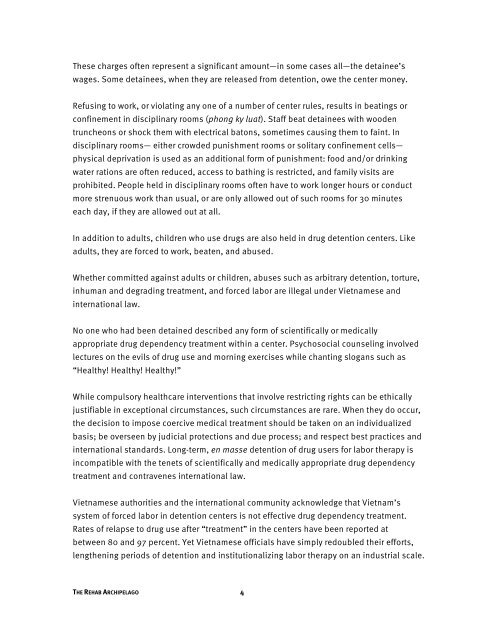The Rehab Archipelago - Human Rights Watch
The Rehab Archipelago - Human Rights Watch
The Rehab Archipelago - Human Rights Watch
You also want an ePaper? Increase the reach of your titles
YUMPU automatically turns print PDFs into web optimized ePapers that Google loves.
<strong>The</strong>se charges often represent a significant amount—in some cases all—the detainee’s<br />
wages. Some detainees, when they are released from detention, owe the center money.<br />
Refusing to work, or violating any one of a number of center rules, results in beatings or<br />
confinement in disciplinary rooms (phong ky luat). Staff beat detainees with wooden<br />
truncheons or shock them with electrical batons, sometimes causing them to faint. In<br />
disciplinary rooms— either crowded punishment rooms or solitary confinement cells—<br />
physical deprivation is used as an additional form of punishment: food and/or drinking<br />
water rations are often reduced, access to bathing is restricted, and family visits are<br />
prohibited. People held in disciplinary rooms often have to work longer hours or conduct<br />
more strenuous work than usual, or are only allowed out of such rooms for 30 minutes<br />
each day, if they are allowed out at all.<br />
In addition to adults, children who use drugs are also held in drug detention centers. Like<br />
adults, they are forced to work, beaten, and abused.<br />
Whether committed against adults or children, abuses such as arbitrary detention, torture,<br />
inhuman and degrading treatment, and forced labor are illegal under Vietnamese and<br />
international law.<br />
No one who had been detained described any form of scientifically or medically<br />
appropriate drug dependency treatment within a center. Psychosocial counseling involved<br />
lectures on the evils of drug use and morning exercises while chanting slogans such as<br />
“Healthy! Healthy! Healthy!”<br />
While compulsory healthcare interventions that involve restricting rights can be ethically<br />
justifiable in exceptional circumstances, such circumstances are rare. When they do occur,<br />
the decision to impose coercive medical treatment should be taken on an individualized<br />
basis; be overseen by judicial protections and due process; and respect best practices and<br />
international standards. Long-term, en masse detention of drug users for labor therapy is<br />
incompatible with the tenets of scientifically and medically appropriate drug dependency<br />
treatment and contravenes international law.<br />
Vietnamese authorities and the international community acknowledge that Vietnam’s<br />
system of forced labor in detention centers is not effective drug dependency treatment.<br />
Rates of relapse to drug use after “treatment” in the centers have been reported at<br />
between 80 and 97 percent. Yet Vietnamese officials have simply redoubled their efforts,<br />
lengthening periods of detention and institutionalizing labor therapy on an industrial scale.<br />
THE REHAB ARCHIPELAGO 4

















